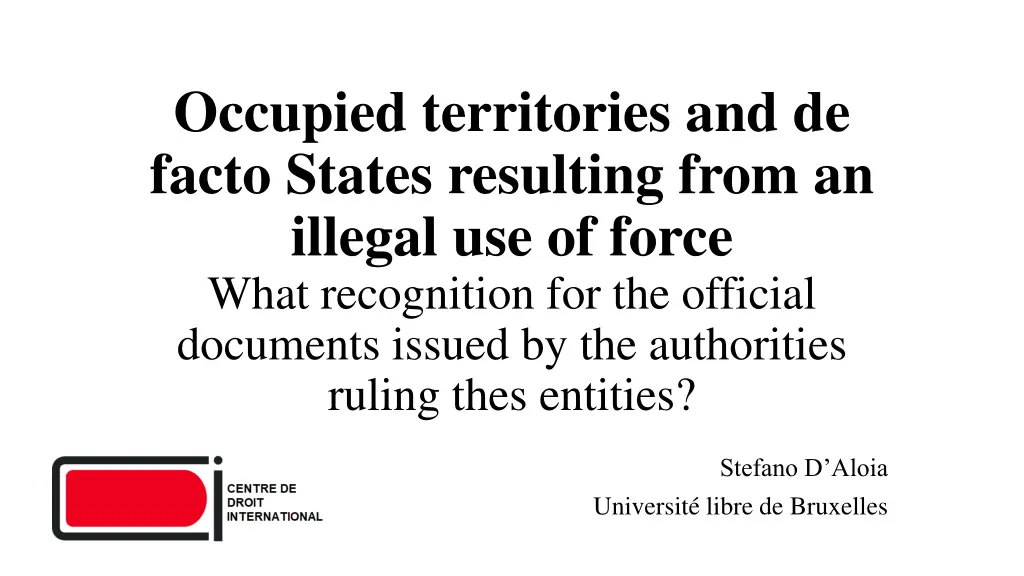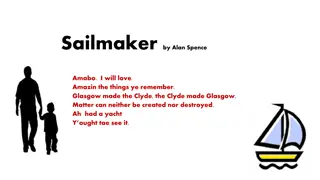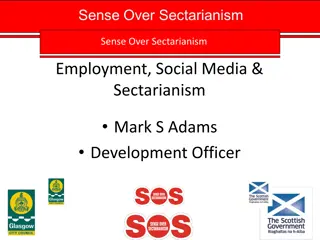
Recognition of Official Documents in Occupied Territories
Understanding the complexities of occupied territories and de facto states resulting from illegal use of force, and the recognition of official documents issued by the ruling authorities in these entities. Exploring definitions, duties to recognize, and examining a legal example to shed light on the intricacies involved.
Download Presentation

Please find below an Image/Link to download the presentation.
The content on the website is provided AS IS for your information and personal use only. It may not be sold, licensed, or shared on other websites without obtaining consent from the author. If you encounter any issues during the download, it is possible that the publisher has removed the file from their server.
You are allowed to download the files provided on this website for personal or commercial use, subject to the condition that they are used lawfully. All files are the property of their respective owners.
The content on the website is provided AS IS for your information and personal use only. It may not be sold, licensed, or shared on other websites without obtaining consent from the author.
E N D
Presentation Transcript
Occupied territories and de facto States resulting from an illegal use of force What recognition for the official documents issued by the authorities ruling thes entities? Stefano D Aloia Universit libre de Bruxelles
Some definitions (1/2) Occupied territory [A territory] is considered occupied when it is actually placed under the authority of the hostile army. The occupation extends only to the territory where such authority has been established and can be exercised. 1907 The Hague Regulations, art. 42 De facto State An entity that has a Government exercising its power or control over a Population established on a Territory, but which is not recognized as a State by the great majority of the States Illegal use of force Use of force between States unauthorized by UNSC nor justified by selfdefence
Some definitions (2/2) Duty not to recognize No State shall recognize as lawful a situation created by a serious breach [of a jus cogens norm], nor render aid or assistance in maintaining that situation. ARSIWA, art. 41, par. 2. Namibia Exception In general, the non-recognition of South Africa's administration of the Territory should not result in depriving the people of Namibia of any advantages derived from international co-operation. In particular, while official acts performed by the Government of South Africa on behalf of or concerning Namibia after the termination of the Mandate are illegal and invalid, this invalidity cannot be extended to those acts, such as, for instance, the registration of births, deaths and marriages, the effects of which can be ignored only to the detriment of the inhabitants of the Territory. ICJ, 1971 AO, par. 125 (emphasis added).
Example 1 Non-criminal Law The facts: Mrs. L. owns a building on the north side of the island of Cyprus Due to different international events, a de facto State resulting from an illegal use of force controls that part of territory where Mrs. L. s building is situated (TRNC) and Mrs. L. flew that territory TRNC enacts different laws (Constitution, act of parliament, administrative decisions) to expropriate Greek- Cypriot residents who flew Northern Cyprus Mrs. L. sues TRNC before the ECtHR My question: Exhaustion of internal remedies should the international tribunal oblige Mrs. L. to seize TRNC s judicial system first?
Example 1 Non-criminal Law The case-law: 90. ( ) it cannot be excluded that former Article 26 of the Convention requires that remedies made available to individuals generally in northern Cyprus to enable them to secure redress for violations of their Convention rights have to be tested. ( ) international law recognises the legitimacy of certain legal arrangements and transactions in situations such as the one obtaining in the TRNC ( ) 92. ( ) that the absence of such institutions would work to the detriment of the members of that community. ( ) 96. Life goes on in the territory concerned for its inhabitants. That life must be made tolerable and be protected by the de facto authorities, including their courts; and, in the very interest of the inhabitants, the acts of these authorities related thereto cannot be simply ignored by third States or by international institutions, especially courts, including this one. To hold otherwise would amount to stripping the inhabitants of the territory of all their rights whenever they are discussed in an international context, which would amount to depriving them even of the minimum standard of rights to which they are entitled. ECtHR, Cyprus v. Turkey, 10 May 2001
Example 2A Criminal Law & Cooperation The facts: Mrs. F. refused to be controlled at the border entering back to TRNC / Mrs. F. was simply going back to the TRNC where she lived (enclaves) and she was arbitrarily arrested by TRNC s police officers Mrs. F. is arrested My question: Was the detention of Mrs. F. by TRNC s authorities lawful under art. 5 ECHR?
Example 2A Criminal Law & Cooperation The case-law: 83. The Court recalls that the overall control exercised by Turkey over the territory of northern Cyprus entails her responsibility for the policies and actions of the TRNC ( ) It would not be consistent with such responsibility under the Convention if the adoption by the authorities of the TRNC of civil, administrative or criminal law measures, or their application or enforcement within that territory, were to be denied any validity or regarded as having no lawful basis in terms of the Convention. 84. The Court, accordingly, considers that when as in the instant case an act of the TRNC authorities is in compliance with laws in force within the territory of northern Cyprus, those acts should in principle be regarded as having a legal basis in domestic law for the purposes of the Convention ( ) This conclusion does not in any way put in doubt either the view adopted by the international community regarding the establishment of the TRNC or the fact that the government of the Republic of Cyprus remains the sole legitimate government of Cyprus (see Cyprus v. Turkey, cited above, 14, 61, 90). ECtHR, Foka v. Turkey, 24 June 2008
Example 2B Criminal Law & Cooperation The Facts: Mr. X. flew Ukraine (Crimea) in 2014 because he felt persecuted for political reasons by both Ukrainian and Russian authorities Mrs. X. seek asylum inAustria Some years later, the Prosecutor s Office of the Russian Federation send a request for extradition to the Austrian authorities for alleged facts committed by X. in Crimea before the annexation of 2014. My question: Will theAustrian Court accept the request for extradition?
Example 2B Criminal Law & Cooperation The case-law: [the annexation occurred] following a threat of force and following the deployment of Russian controlled troops, respectively, therefore in violation of the prohibition of the use of force under Article 2(4) of the Charter of the United Nations as a peremptory norm of general international law. [The integration of Crimea into the Russian Federation constitutes therefore] an (attempted) annexation in violation of international law. From the customary international law codified in Article [41] Paragraph 2 of the Articles on the Law of State Responsibility ( ), all states have an obligation under international law not to recognize the situation that has arisen in a manner that violates international law. Based on this ( ) the autonomous Republic of Crimea and the city of Sevastopol continue to be part of the national territory of Ukraine under international law and are therefore currently part of the Russian Federation Ukrainian territory occupied in violation of international law. Consequently, all acts of sovereignty by Russian authorities for or concerning the autonomous Republic of Crimea and the city of Sevastopol as Ukrainian national territory are fundamentally contrary to international law and therefore invalid; In principle, international agreements of the Russian Federation do not extend to the territory of the Republic of Crimea, including the city of Sevastopol. The judicial authorities of the Russian Federation are therefore not entitled under international law to prosecute the person concerned for criminal offences under the Criminal Code of the Russian Federation stated in the extradition request Oberlandsgericht Linz (Austria), Crimea Annexation Case, 16 November 2016, ILR, 188, p. 350, available in DE
Example 3 Health The facts: EU sent vaccines against Covid-19 to TRNC People in TRNC are vaccinated against Covid-19 TRNC health authorities issued a Vaccination Certificate My question: Will the States (other than Turkey) allow people travelling with a TRCN Vaccination Certificate or will the States nonetheless impose a quarantine to those individuals?
Example 3 Health The precedent Between 10 January 2022 and 18 March 2022, the website of the UK Health authorities was updated to add the TRNC issued Certificate as valid Vaccine Certificate in order to enter to UK No specific justification Several requests made by UK citizens resident in TRCN (British Residents Society) We understand that some people vaccinated in the north of Cyprus may not have access to a UK-accepted certificate and are looking at whether there are ways to address this (Question no UIN 73901 from Drew Hendry to the Secretary of State for Foreign, Commonwealth and Development Affairs (answer from Wendy Morton), 12thNovember 2021
Occupied territories and de facto States resulting from an illegal use of force What recognition for the official documents issued by the authorities ruling thes entities? Stefano D Aloia Universit libre de Bruxelles






















